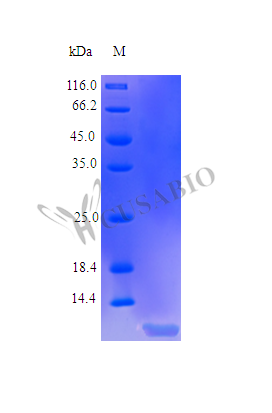Recombinant Human Insulin-like Growth Factor II (IGF2) is expressed in E. coli and spans the full length of the mature protein, from amino acids 25 to 91, presented tag-free. The product achieves a purity level exceeding 98% as determined by SDS-PAGE. It appears to be fully biologically active, with an ED50 of less than 2 ng/ml in a cell proliferation assay using serum-free human MCF-7 cells, corresponding to a specific activity greater than 5.0 × 10^5 IU/mg. The endotoxin level remains below 1.0 EU/µg, as assessed by the LAL method.
IGF2 serves as a critical growth factor in human development and cell proliferation. The protein plays a key role in regulating cellular growth, differentiation, and survival. As an important component of the insulin-like growth factor signaling pathways, IGF2 is essential in various physiological processes and may have significant implications in research related to growth disorders and metabolic regulation.
Potential Applications
Note: The applications listed below are based on what we know about this protein's biological functions, published research, and experience from experts in the field. However, we haven't fully tested all of these applications ourselves yet. We'd recommend running some preliminary tests first to make sure they work for your specific research goals.
1. Cell Proliferation and Growth Assays
This recombinant IGF2 is highly biologically active (ED₅₀ < 2 ng/ml) and ideal for proliferation studies in IGF-responsive cells like MCF-7. The high potency allows for precise dose-response studies in serum-free conditions. Researchers should note that IGF2 primarily signals through IGF1R and IGF2R, and optimal concentrations may vary for different cell types based on receptor expression levels. The low endotoxin ensures minimal non-specific stimulation in sensitive proliferation assays.
2. IGF Receptor Binding and Signaling Studies
The protein is excellent for studying IGF1R and IGF2R binding and downstream signaling (AKT, ERK pathways). The extremely high affinity (sub-nanomolar range implied by <2 ng/ml ED₅₀) makes it suitable for detailed kinetic studies. The tag-free design ensures accurate measurement of receptor-ligand interactions without steric hindrance. Time-course experiments can reliably map phosphorylation events and receptor internalization dynamics.
3. Antibody Development and Validation
This high-purity, full-length mature IGF2 serves as an ideal antigen for antibody development. The confirmed bioactivity ensures antibodies will recognize functional conformational epitopes. Antibodies should be validated for their ability to neutralize IGF2 bioactivity in proliferation assays. The tag-free nature eliminates concerns about antibody specificity toward purification tags rather than native IGF2 epitopes.
4. Protein-Protein Interaction Studies
The biologically active IGF2 is suitable for studying interactions with IGF-binding proteins (IGFBPs) and receptors. However, researchers should note that IGF2's affinity for IGFBPs is extremely high (picomolar range), requiring sensitive detection methods. Binding studies should account for the fact that IGF2's bioavailability is primarily regulated by IGFBPs in physiological conditions. The high purity minimizes non-specific interactions in pull-down or SPR assays.
5. Biochemical Characterization and Structural Studies
This IGF2 is excellent for biochemical studies, but researchers should note that while the E. coli expression produces a non-glycosylated protein, native IGF2 is also non-glycosylated, making this preparation highly representative of the natural protein. Techniques like circular dichroism can reliably assess secondary structure, and the high purity supports crystallization attempts for structural studies. The protein's stability under various conditions can be accurately characterized.
Final Recommendation & Action Plan
This recombinant human IGF2 is an exceptionally high-quality reagent suitable for all proposed applications without significant limitations. The demonstrated high potency (ED₅₀ < 2 ng/ml) and specific activity (>5.0×10⁵ IU/mg) indicate proper folding and full biological functionality. For immediate use, employ it in the 0.5-5 ng/ml range for proliferation and signaling studies, leveraging its high affinity for precise dose-response experiments. When developing antibodies, this protein is ideal for both immunization and validation due to its native sequence and confirmed bioactivity. For interaction studies, the tag-free design ensures authentic binding measurements, though researchers should account for IGF2's picomolar affinity for IGFBPs in experimental design. The E. coli expression system is particularly appropriate for IGF2 since the native protein is non-glycosylated, making this preparation highly physiologically relevant. Always include proper controls and consider that different cell types may exhibit varying sensitivity based on IGF receptor expression levels. The high purity and low endotoxin make this protein particularly valuable for sensitive cell-based assays where minimal stimulation can yield measurable responses.




